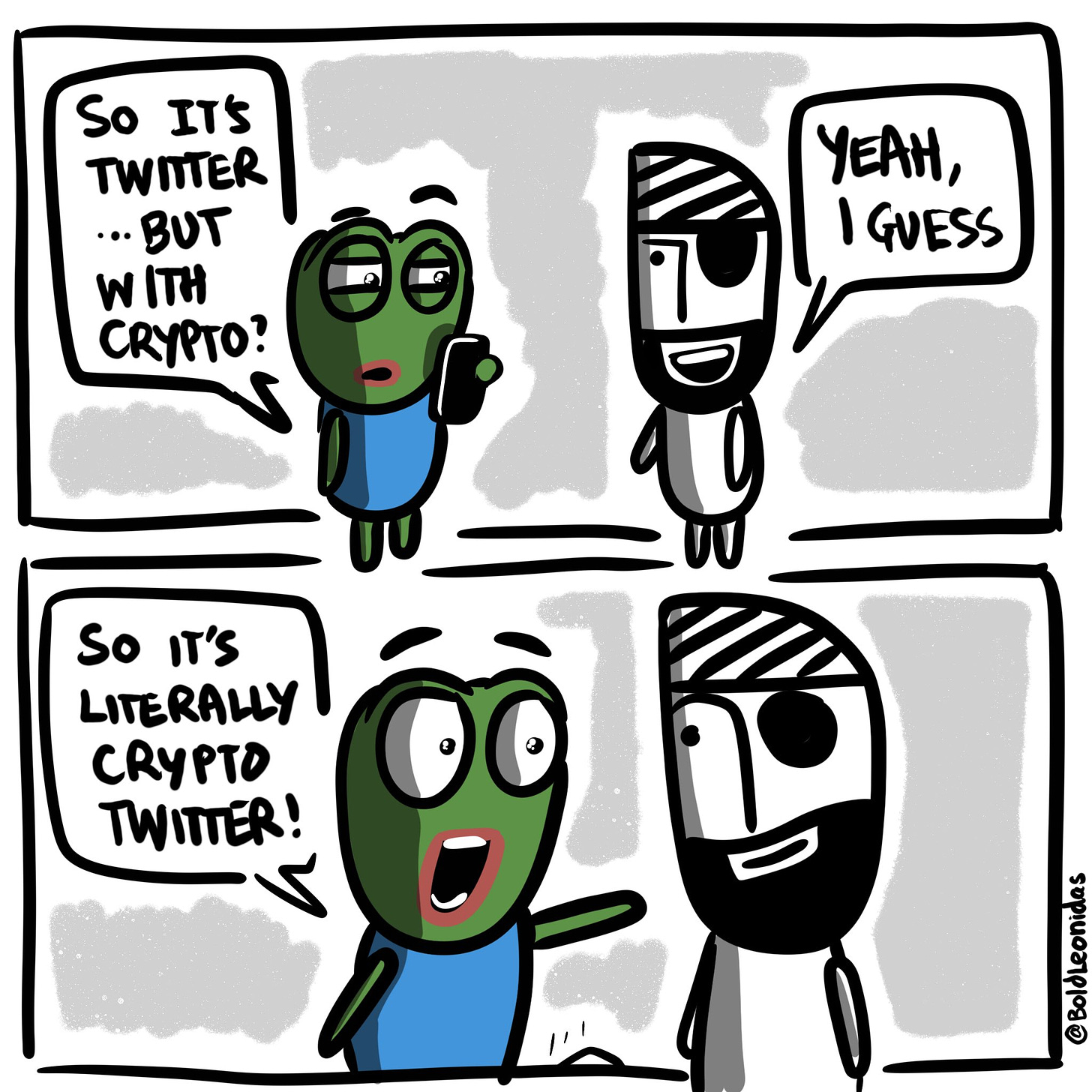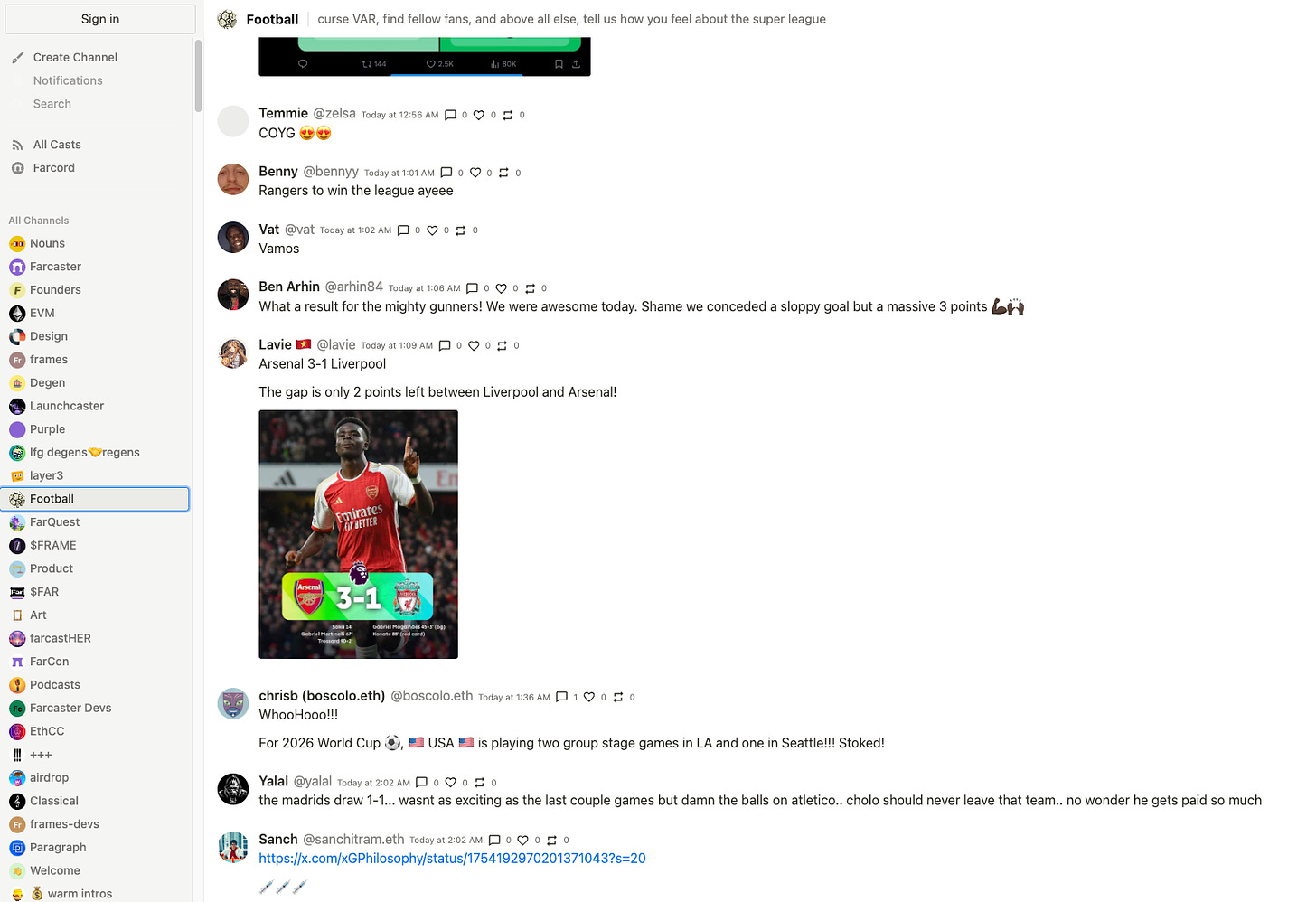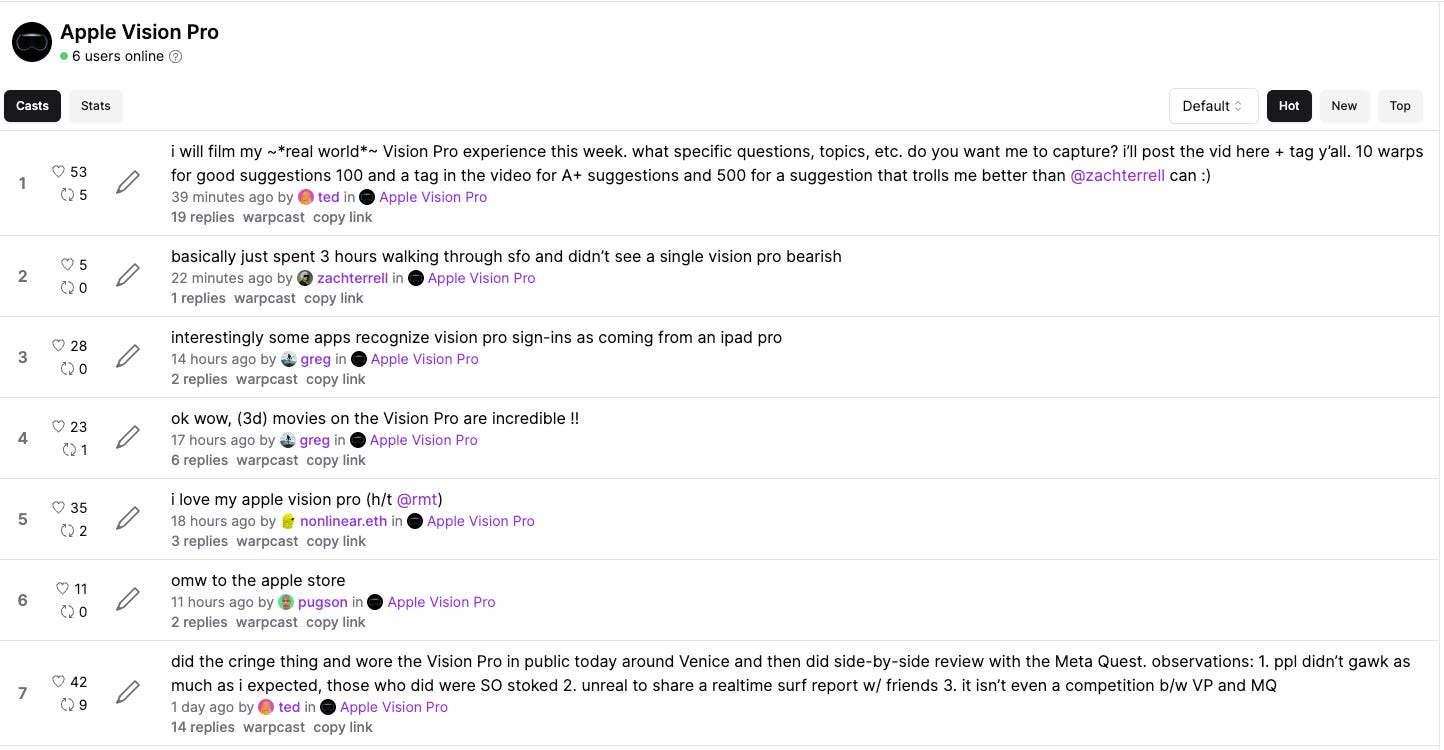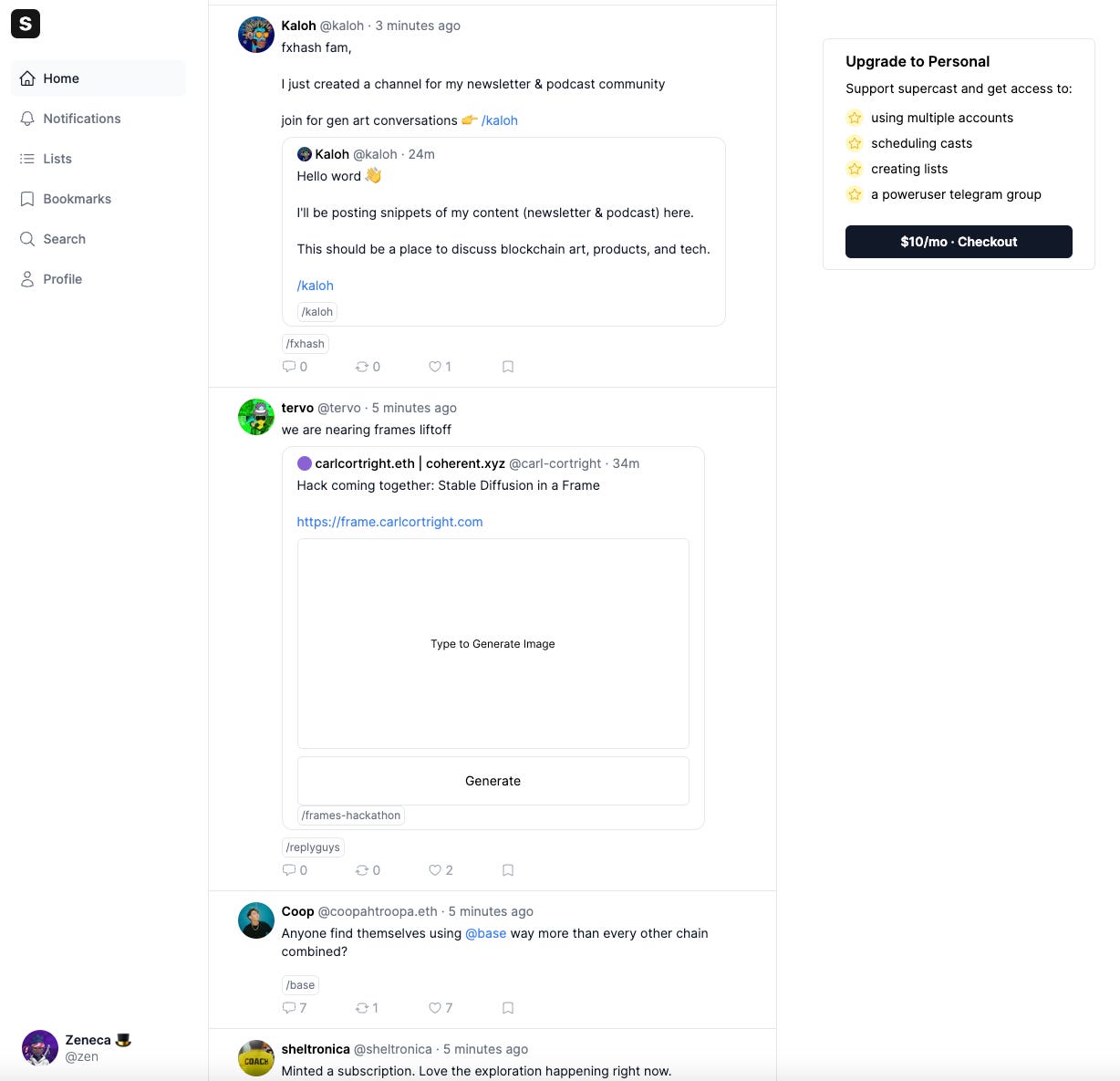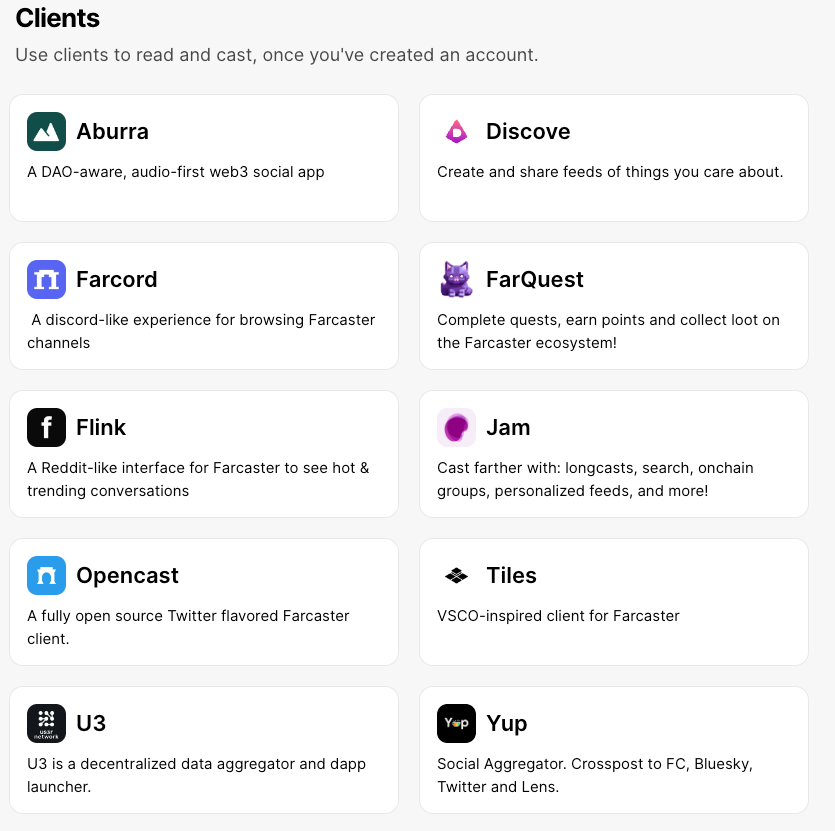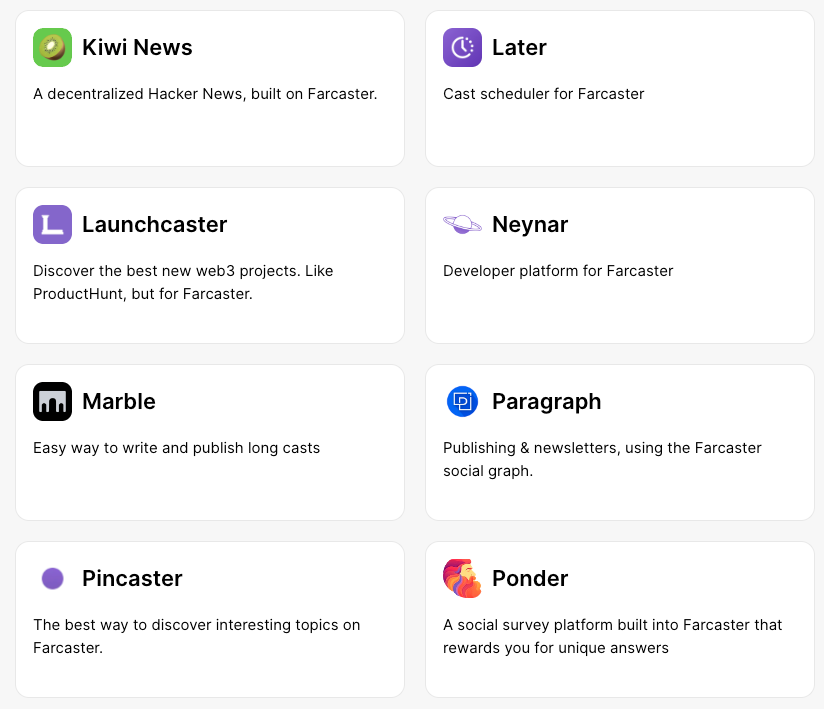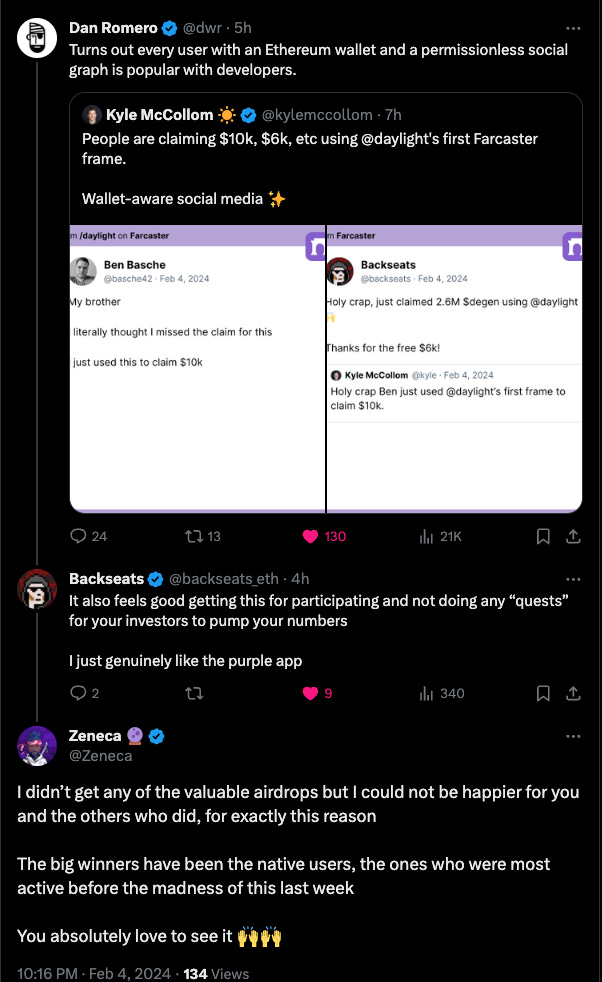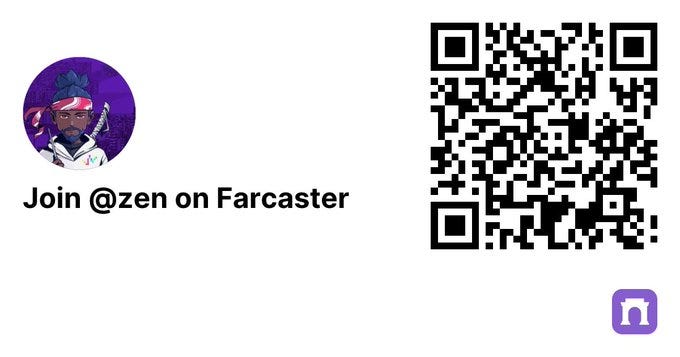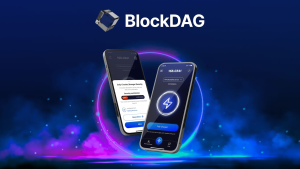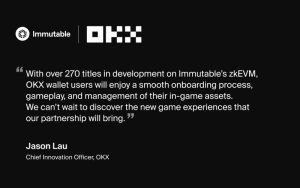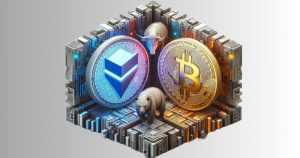Letter 50: Farcaster, Warpcast, Whatcast?
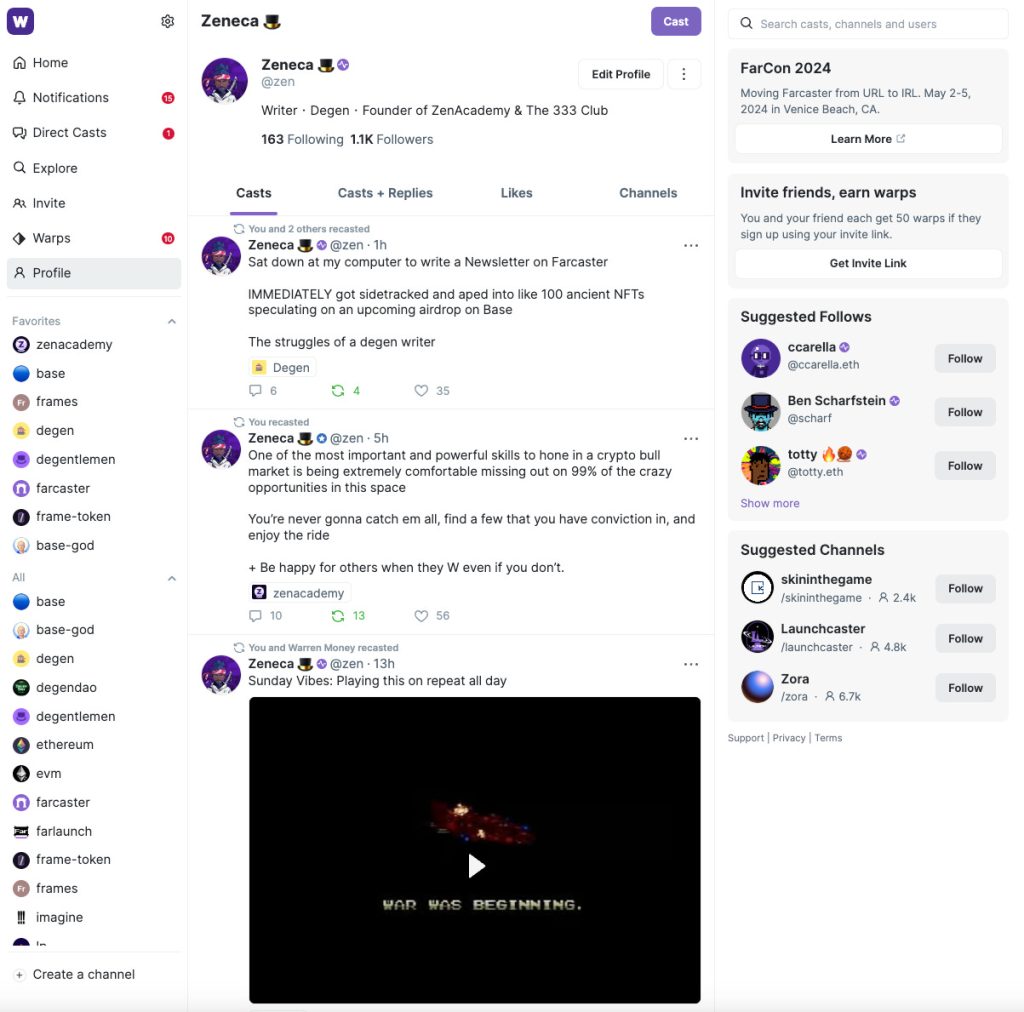
Advertisement: Click here to learn how to Generate Art From Text
Farcaster is the talk of the crypto town this week. But boy is there a lack of understanding out there about what Farcaster is. I’m here to try to clear that up.
I want to state right at the top that I know many of you might be incredibly weary of anything in the “decentralized social” (DeSo) and “social finance” (SoFi) areas, especially after what happened with Friend Tech over the last few months. Well, as someone who wrote 5000 words on Friend Tech and told you it would almost certainly come crashing down, I hope I have earned a modicum of your trust and a moment of your time to try and explain to you why THIS IS DIFFERENT.
The quickest way to highlight this is by saying that Friend Tech was almost entirely about the Financial side of things and only slightly about the Social and the Decentralization sides. Farcaster is almost entirely about the Social and Decentralization sides, and only slightly about the Financial side.
Farcaster has no native token, there is no ponzi, it is just a good product, built by great developers, and used by great developers
There’s quite a lot to unpack and it does get complex — but I am going to be intentionally light on the complexity. If you want to learn how it all works under the hood, i’ll share links where you can go down the rabbit hole. But I want to write for the layperson who just wants to know what the big deal is.
So, what is Farcaster, what is Warpcast, why is it getting attention now, and how can you get involved?
Farcaster is a sufficiently decentralized social media protocol.
What does “sufficiently decentralized” mean, you say?
In the words of co-founder Varun Srinivasan:
A social network achieves sufficient decentralization if two users can find each other and communicate, even if the rest of the network wants to prevent it.
This implies that users can always reach their audience, which can only be true if developers can build many clients on the network. If only one client existed, it could stop users from communicating… (continued here)
Sounds pretty good right? And it is!
Imagine if Twitter was built on a decentralized protocol. If you’ve ever been unhappy with how things are being run: the ads you’re seeing, the content you’re seeing, the terribleness of The Algorithm, the amount you’re paying per month for your verified badge… wouldn’t it be nice if someone could create a new client that had all of the same users & content as Twitter, except had a different approach to ads, content, The Algorithm, and subscriptions?
Wouldn’t it be nice if you could never have your account banned, or shadow banned?
Or if you’re a developer or someone who runs a business on Twitter, Facebook, or YouTube, wouldn’t it be nice if our corporate overlords couldn’t just remove API access or change their ad rules and completely destroy your life’s work leaving you high and dry with little to no recourse?
Wouldn’t it be nice if you knew with certainty that you couldn’t be rugged like this?
That’s basically how Farcaster works.
Because the protocol is sufficiently decentralized, it means that any developer can build an application to interact with the protocol.
And if you (as a user) don’t like it, you can just try another, or another, or another (further down I’ll share a bunch of the current clients for you to see). If you really hate them all (but still want to use the protocol), and are sufficiently determined, you can make your own.
It’s really, really, really, really, really, really, really, really, really, really, really, freaking important to have something like this exist in the world.
Do you have any idea how much power the large social media companies hold? How they can influence our thoughts, opinions, emotions, elections, and everything, by changing what we see in our feeds?
It is a lot, and it is scary, and it is dangerous.
Farcaster presents a solution to this. It provides a way to bring the power back in the hands of the people, and not 5 companies. It does what crypto is doing for finance (and other things), but for social media. Unsurprisingly, it uses blockchains under the hood to achieve it all.
THIS is what true, lasting, Decentralized Social Media looks like. Not the ponzinomical (is that a word? that should be a word) factories in the ilk of Friend Tech, but this — good tech, built openly, for anyone to engage with and build on top of. Censorship resistant. Permissionless. ALL the things we love about crypto, except, for social media.
Decentralized Social Media IS the future. It is necessarily important, and it is significantly better for the end user. Mass adoption will take time, as all of this is obviously still too complex and foreign a concept for most people to wrap their heads around. But it is the future, and Farcaster is setting itself up to be a strong contender for being the platform that brings DeSo to the world.
Last note on Farcaster — one of the ways it is set up to prevent against mass spam, is by requiring a small amount of money to be paid per account to buy storage. This costs $7 per year at the moment. I’ve heard people say “well if Farcaster is so Decentralized, why is Warpcast asking me to pay????” — this is your answer. Also, fwiw, Warpcast is subsidizing the cost for something like 20 countries in the world atm, making it free for a lot of users.
If you’ve heard about Farcaster this last week, you’ve probably also heard about Warpcast. You’re also probably very confused about what the difference is.
In very simple terms:
Farcaster is the decentralized protocol.
Warpcast is an application built on top of it.
Warpcast is just one (of many) apps built on top of it that make it easy for people to use the protocol to communicate with one another.
These apps are not decentralized, but they don’t need to be (nor can they realistically be, if we want them to do all the things we expect out of social media today). The important stuff is decentralized, and that’s what matters.
There’s been a lot of nonsense on Twitter lately about people complaining about how Farcaster isn’t decentralized because some people are struggling to make an account on Warpcast.
This is like saying Bitcoin isn’t decentralized because you’re struggling to make an account on Coinbase.
Warpcast is built by the same team that developed Farcaster, and it’s the most popular client at the moment — so it’s understandable that there’s some confusion. But it is still a centralized company, a team of like 12 people, who are working on some software to make it easier for us all to interact with the underlying, decentralized, protocol.
They’re going through some teething issues as the app explodes in popularity, hence why some people have had trouble signing up for an account with them. I’m sure things will be running smoothly enough soon enough (but if not.. you can always use a different app!)
Speaking of which, let’s look at some of the apps you can use now.
Starting with Warpcast, which is basically a Twitter/X clone, and so it makes it familiar and comfortable for a lot of people. This is what it looks like on my profile page:
…and I can’t help but share a good ole BoldLeonidas meme here:
Moving on — Here’s Farcord, a Discord-style app (remember, these use all the same accounts, and all the same content):
Here’s a Reddit-style app called Flink:
And here’s Supercast, another Twitter/X style interface. One of the nice things is that, by default, your feed will show you casts from the people you follow in reverse chronological order. It also has a subscription model that is targeting more advanced/power users:
And there are MANY more.
It’s very cool. It’s buzzing. Devs are building. And it’s only ever going to get better from here.
Now let’s address the elephant in the room: you’re probably thinking “okay this is cool but it’s really freaking hard to dethrone an incumbent social media platform”.
And you’re right, it is. I’m not sure the goal or plan or even hope in the short-medium term is to dethrone any platform, and i’m not sure it needs to be. Twitter doesn’t have to die for Farcaster to succeed. There is a world in which we have Facebook, Twitter, YouTube, Instagram, TikTok, Snapchat, AND Farcaster. Okay but how?
Again let’s go to the wisdom of co-founder Varun Srinivasan:
Successful social networks are usually built around a new communication primitive. Facebook had the wall, Twitter had the 140-character tweet and Snapchat had the ephemeral message. The idea maze of things you can do with decentralized identities, blockchains and zk-proofs is large, weird and interesting enough that there are probably many primitives waiting to be discovered. Decentralized social networks should explore this as a way to attract users. Offering a product experience that doesn’t yet exist is far more compelling than a clone of an existing network. (emphasis added by me)
We’re still in the extreme early stages of Farcaster. If you can’t see how it’s ever gonna overtake X by being an X clone.. you’re thinking too small. That’s probably not what’s gonna happen. It becomes a social network in it’s own right by doing things in it’s own right, and, hopefully, in new and novel ways.
As the world eeks forward into web3 adoption, we’re going to see interesting and exciting new approaches to decentralized social media.
Farcaster has been around since 2021. It was launched by Dan Romero and the aforequoted Varun Srinivasan and had been taking the slow and steady approach to growth, mostly attracting devs and the most hardcore crypto and decentralization nerds, that is.. until last week.
Last week they shipped something called “Frames”. Rather than tell you myself, I’ll just share what PackyMcCormick wrote in his excellent Newsletter last week and tell you to go read that after you’re done with this one:
Frames let people build small apps that run inside of casts.
They’re essentially small, interactive iframes embedded in casts, hence the name. Like casts, handles, and channels, Frames work in any Farcaster client.
Frames can support anything from Doom [the video game] to polls to block explorers to mints to buys to prediction markets.
Frames are just a canvas; developers will figure out what to paint on them.
It might seem like a small thing if you’re not a developer, but it’s actually an amazing thing to be able to build little apps within a social media platform/feed. It unlocks an insane amount of creativity and innovation possibilities.
Frames have absolutely exploded and with them brought the attention of Crypto Twitter (CT). There were Frames that had free mints, one-click-mints directly from your feed. There were Frames that had free token claims, one-click-claims directly from your feed, sent directly to your connected ETH wallet.
If there’s one thing CT likes, it’s airdrops. If there’s another, it’s making money. Well, Farcaster has spawned a flurry of attention and activity around both of these things. The earliest users of the protocol have been handsomely rewarded, many receiving tokens worth 4-5 figures simply for being an early active user.
And with all that, comes a flurry of users:
As for the airdrops, this interaction from earlier sums up my feelings. It’s nice to see airdrops reward actual users for a change, and not airdrop farmers (nothing against airdrop farmers, I am one myself):
Frames brought the devs.
Speculating on tokens brought the degens.
Farcaster now has a thriving community of both. It’s fun, it’s exciting, and it feels really freaking good.
It seems as though $DEGEN (a token on the Base Chain) is the token most people are choosing to speculate on. This is not an official token for Farcaster, which nicely means it is also not VC backed; Paradigm or a16z don’t have a large supply unlocking any time soon.
It was fairly distributed to users of the protocol in a nice “bottom up” approach. It is a community token that airdropped to users, and will continue to airdrop to users. If you want to learn how to get involved, their website has more details.
The nice thing about permissionless protocols is that anyone can choose to integrate the token if they want. There have been NFT mints in DEGEN, airdrops just to DEGEN holders, DAOs forming around the token, games forming around the token, and much more.
It’s not just DEGEN that is having a moment in the sun though, it seems that the whole Base (L2) ecosystem is flourishing due to Farcaster’s adoption. There’s something happening, and it’s worth paying attention. Devs, degens, and creators alike are all meshing together in a fun farcaster freny.
Another such mesh is Base God ($TYBG). It’s… basically a cult, BUT, it’s a hellofanice cult, at least:
THE FIRST COMMANDMENT
Thou shalt treat community members with respect, for all $TYBG and Base Gods holders are equally based.
And their mission is admirable:
THE SECOND COMMANDMENT
Thou shalt be onchain. Creating content such as memes, tweets, onchain apps, or anything else and pushing it onchain is the way of the Onchain Disciple.
They’re educating people about transacting on-chain, and doing it with memes. It’s this kind of lightheartedness that can take something as heavy and complex as decentralized social media and make it fun and accessible to a lot more people than just the developers.
Also if there’s one thing i’ve learned as a trader in crypto, it is you do not bet against cults. Full disclosure, I own a lot of both TYBG and DEGEN.
With the good comes the bad though. It is not all airdrops and roses. As you might imagine, now that the cat is out of the bag, there’s a bazillion users flooding to Farcaster to try and get their hands on the next airdrop. The protocol has a lot of spamming and a lot more noise now. Fixes are on the way as each client tries to figure out how best to deal with this.
Warpcast, at least, is already better today than it was yesterday due to some tweaks they made to their algorithm.
But hey, if you don’t like it, there’s many other clients out there that you can try 🙂
I believe the easiest way at the moment is via Warpcast. In order to create an account (via Warpcast), you need to download the app. Scan the QR code (or click here) and it’ll take you to the right place.
Depending on where you live, you might have to pay a small fee to get up and running. I know it’s a barrier to entry, and it’s very much not insignificant to a lot of people in the world. If you genuinely can’t afford or justify the cost, drop a comment below — I can gift a free year to people and I’ll try and do as many as I can. Would be happy to do a few hundred, but the logistics make my head hurt!
I’ll start by individually sending out links to people who comment, but hopefully can come up with a solution that scales better soon.
Once you’ve got an account and are logged in, I recommend that you go to Setting → Connected Addresses → Connect, and link one of your Ethereum addresses to your account. This will allow you to do things like receive NFT mints or token airdrops from Frames you interact with on the site, as well as allow you to display NFTs on your profile, and other things.
I would also recommend joining a few Channels and starting to engage with people. Follow your interests, and connect with other humans. Do the whole social part of social media. Good things tend to happen when people genuinely do that. A few places to start:
ZenAcademy – gotta make sure you join the Zen community!
Farcaster – Great first Channel to join, lots of activity
Reply Guys – Nice friendly community to welcome newcomers from CT
Base – Hang out and connect with the community of builders on Base
The Yellow Collective – An amazing club to support and empower artists and creatives
Degen – If meme coins and being a degen is your thing, this is the place for you
Then, once you’re used to it a bit, check out some of the other apps built on Farcaster.
And.. there we have it. I hope by now you get the gist of it. I hope you see why this is different to most of the other attempts at Decentralized Social we’ve seen to date in the crypto space. If I could sum it up in 4 simple, glorious, point-less words:
There Is No Ponzi.
If you want to understand how things work under the hood, Cygaar wrote an excellent thread breaking it down: https://twitter.com/0xCygaar/status/1754227118828105791
Sufficient Decentralization for Social Networks
Framing the Future of the Internet
Thanks for reading! Next Newsletter will be on EIGENLAYER. If you enjoyed this, please consider subscribing – I send out this free Newsletter with my thoughts on the market and deep dives on interesting topics related to web3. Your subscription genuinely helps me, and I appreciate it. If you really wanna help, send this to a friend <3
Disclaimer: The content covered in this newsletter is not to be considered as investment advice. I’m not a financial adviser. These are only my own opinions and ideas. You should always consult with a professional/licensed financial adviser before trading or investing in any cryptocurrency related product.
Disclosure: I hold $DEGEN and $TYBG, along with other cryptocurrencies not mentioned on the Base chain.

‘ Credit:
Original content by zeneca33.substack.com – “Letter 50: Farcaster, Warpcast, Whatcast?”
Read the full article at https://zeneca33.substack.com/p/letter-50-farcaster-warpcast-whatcast
